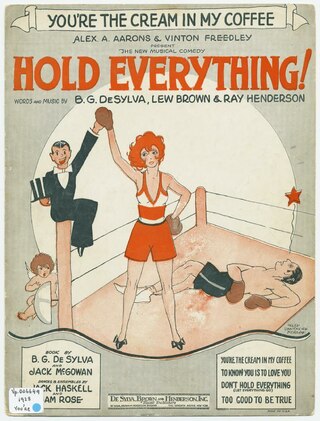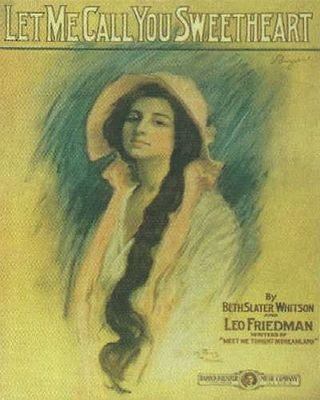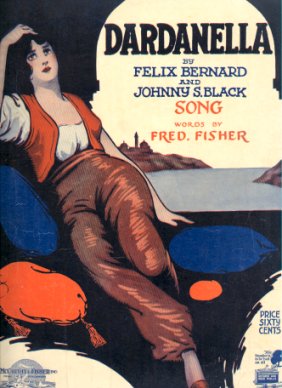Related Research Articles

"Istanbul (Not Constantinople)" is a 1953 novelty song, with lyrics by Jimmy Kennedy and music by Nat Simon. It was written on the 500th anniversary of the fall of Constantinople to the Ottomans. The lyrics humorously refer to the official renaming of the city of Constantinople to Istanbul. The song's original release, performed by The Four Lads, was certified as a gold record. Numerous cover versions have been recorded over the years, most famously a 1990 version by They Might Be Giants.

"Sweet Georgia Brown" is a jazz standard composed in 1925 by Ben Bernie and Maceo Pinkard, with lyrics by Kenneth Casey.

"Night and Day" is a popular song by Cole Porter that was written for the 1932 musical Gay Divorce. It is perhaps Porter's most popular contribution to the Great American Songbook and has been recorded by dozens of musicians. NPR says "within three months of the show's opening, more than 30 artists had recorded the song."
"Lullaby of Broadway" is a popular song with music written by Harry Warren and lyrics by Al Dubin, published in 1935. The lyrics salute the nightlife of Broadway and its denizens, who "don't sleep tight until the dawn."
"You'll Never Know", sometimes referred to as "You'll Never Know (Just How Much I Love You)" in later years, is a popular song with music written by Harry Warren and the lyrics by Mack Gordon. The song is based on a poem written by a young Oklahoma war bride named Dorothy Fern Norris.
"It's Magic" is a popular song written by Jule Styne, with lyrics by Sammy Cahn, published in 1947. They wrote the song for Doris Day in her Warner Brothers film debut, Romance on the High Seas. In the autumn of 1948 Vic Damone, Tony Martin, Dick Haymes, Gordon MacRae and Sarah Vaughan all charted on Billboard magazine charts with versions of the song, but none as successfully as Day's recording. "It's Magic" received an Academy Award nomination for Best Song, but in March 1949 lost to "Buttons and Bows" by Jay Livingston and Ray Evans.
"Too Marvelous for Words" is a popular song written in 1937. Johnny Mercer wrote the lyrics for music composed by Richard Whiting. It was introduced by Wini Shaw and Ross Alexander in the 1937 Warner Brothers film Ready, Willing, and Able, as well as used for a production number in a musical revue on Broadway. The song has become a pop and jazz standard and has been recorded by many artists.

"I'll See You in My Dreams" is a popular song and jazz standard, composed by Isham Jones, with lyrics by Gus Kahn, and published in 1924. It was recorded on December 4 that year, by Isham Jones conducting Ray Miller's Orchestra. Released on Brunswick Records, it charted for 16 weeks during 1925, spending seven weeks at number 1 in the United States. Other popular versions in 1925 were by Marion Harris; Paul Whiteman; Ford & Glenn; and Lewis James; with three of these four reaching the Top 10.

"You're the Cream in My Coffee" is a popular song published in 1928. Hit recordings were by Annette Hanshaw, Ben Selvin, Ted Weems and Ruth Etting.

"Let Me Call You Sweetheart" is a popular song, with music by Leo Friedman and lyrics by Beth Slater Whitson. The song was published in 1910 and was a huge hit for the Peerless Quartet in 1911. A recording by Arthur Clough was very popular the same year too. A 1924 recording identifies a Spanish title, "Déjame llamarte mía".
"September in the Rain" is a popular song about nostalgia by Harry Warren and Al Dubin, published in 1937. The song was introduced by James Melton in the film Melody for Two. It has become a standard, having been recorded by many artists since.

"The Gold Diggers' Song " is a song from the 1933 Warner Bros. film Gold Diggers of 1933, sung in the opening sequence by Ginger Rogers and chorus. The entire song is never performed in the 1933 movie, though it introduces the film in the opening scene. Later in the movie, the tune is heard off stage in rehearsal as the director continues a discussion on camera about other matters.
"Mean to Me" is a popular song with music by Fred E. Ahlert and lyrics by Roy Turk, published in 1929. Hit versions that year were by Ruth Etting and by Helen Morgan. Ben Bernie and the Hotel Roosevelt Orchestra also recorded what might be the first male version in February 1929 with vocals by Scrappy Albert.

"You Must Have Been a Beautiful Baby" is a popular song with music by Harry Warren and lyrics by Johnny Mercer, written in 1938 for the Warner Brothers movie Hard to Get, released November 1938, in which it was sung by Dick Powell.
"Rockin' Chair is a 1929 popular song with lyrics and music composed by Hoagy Carmichael. Musically it is unconventional, as after the B section when most popular songs return to A, this song has an A-B-C-A1 structure. Carmichael recorded the song in 1929, 1930, and 1956. Mildred Bailey made it famous by using it as her theme song. Like other 1920s standards, "Rockin' Chair" relied on the stereotypes of minstrelsy, citing "Aunt Harriet" from the anti-Uncle Tom song "Aunt Harriet Becha Stowe" (1853).

"Dardanella" is a popular song published in 1919 by McCarthy & Fisher, Inc., a firm owned by Fred Fisher, lyricist, for music composed by Felix Bernard and Johnny S. Black.
"Quiet Village" is an orchestral pop instrumental that was written and originally performed by Les Baxter in 1951 and an instrumental album from 1959 by Martin Denny. In the liner notes to his album, Ritual of the Savage , Baxter described the themes he was conveying in the work:
[t]he jungle grows more dense as the river boat slowly makes its way into the deep interior. A snake slithers into the water, flushing a brilliantly plumaged bird who soars into the clearing above a quiet village. Here is a musical portrait of a tropical village deserted in the mid-day heat.

Orienta is an album by The Markko Polo Adventurers released in 1959. The album was produced by Simon Rady, arranged and conducted by Gerald Fried and recorded in stereo in Hollywood, California. The album uses a combination of sound effects and Asian-inspired music to tell humorous vignettes. Its suggestive cover art features a photograph by Murray Laden.
Moanin' Low is a popular torch song. The music was written by Ralph Rainger; the lyrics by Howard Dietz. The song was published in 1929 and was introduced that same year in the musical revue The Little Show by Libby Holman becoming a hit and Holman's signature song. A recording by The Charleston Chasers was also popular in 1929.
"Sweet and Lovely" is an American popular song of 1931, composed by Gus Arnheim, Charles N. Daniels, and Harry Tobias.
References
- ↑ Whitburn, Joel (1986). Joel Whitburn's Pop Memories 1890-1954. Menomonee Falls, Wisconsin: Record Research Inc. p. 279. ISBN 0-89820-083-0.
- ↑ "The Online Discographical Project". 78discography.com. Retrieved May 5, 2020.
- ↑ "Discogs.com". Discogs.com. 1961. Retrieved May 5, 2020.
- ↑ "Discogs.com". Discogs.com. 1976. Retrieved May 5, 2020.